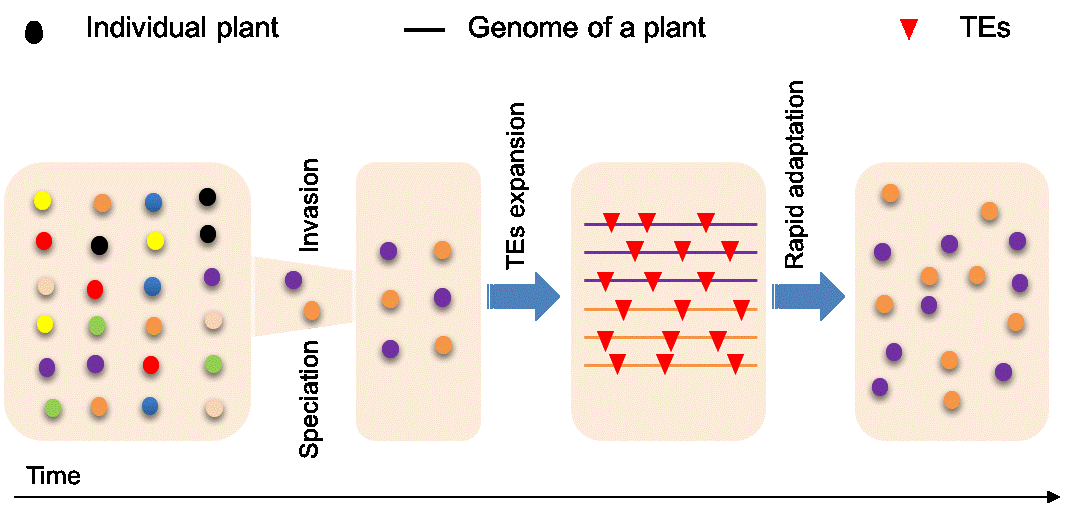Species often experience a genetic bottleneck after speciation or introduction into a new area that diminishes their genetic variation. Though bottlenecks in population size always reduce fitness and evolutionary potential, introduced species often become invasive. This referred to as the genetic paradox of invasion.
Now, a research group led by Prof. Ya-Long Guo from the Institute of Botany, Chinese Academy of Sciences (IBCAS), and their collaborators Song Ge (IBCAS), and Sureshkumar Balasubramanian from School of Biological Sciences, Monash University, Australia, have revealed that transposable element (TE) insertions could potentially help adapting to novel environments in species with limited genetic variation.
To evaluate how the TE insertions drive rapid phenotypic variation and help plants to adapt to new environments, researchers used an annual and inbreeding forb (Brassicaceae), Capsella rubella, compared with its outcrossing sister species Capsella grandiflora. They found that transposable elements (TEs) are highly enriched in the gene promoter regions of C. rubella compared with its outcrossing sister species C. grandiflora.
Interestingly, they found that a number of polymorphic TEs in C. rubella are associated with changes in gene expression, including TEs inserted into FLOWERING LOCUS C gene, which is one of the key determinant genes of flowering time. Intriguingly, the accessions with TE insertion distributed in the southernmost habitat of this species around the Mediterranean region. This region harbors a Mediterranean climate and is characterized by high precipitation, warm winters, and dry and hot summers. These results indicate that the genetic variation caused by the expansion of TEs can help species quickly adapt to new habitats and its influence on adaptive traits could account for the genetic paradox of biological invasion to some extent.
This study was published in PNAS on March 12, and was supported by the National Natural Science Foundation of China (to Y.-L.G.), Strategic Priority Research Program of the Chinese Academy of Sciences (to Y.-L.G.), the Innovative Academy of Seed Design, Chinese Academy of Sciences (to Y.-L.G.), Chinese Academy of Sciences President’s International Fellowship for Visiting Scientists (to S.B.), and Monash University Larkins Fellowship (to S.B.).

Expansion of transposable elements explains genetic paradox of biological invasion.
Articlelink:https://www.pnas.org/content/early/2019/03/13/1811498116
CONTAC INFO:
Institute of Botany, Chinese Academy of Sciences,
20 Nanxincun, Xiangshan, Beijing 100093, China
E-mail: Int_office@ibcas.ac.cn
Species often experience a genetic bottleneck after speciation or introduction into a new area that diminishes their genetic variation. Though bottlenecks in population size always reduce fitness and evolutionary potential, introduced species often become invasive. This referred to as the genetic paradox of invasion.
Now, a research group led by Prof. Ya-Long Guo from the Institute of Botany, Chinese Academy of Sciences (IBCAS), and their collaborators Song Ge (IBCAS), and Sureshkumar Balasubramanian from School of Biological Sciences, Monash University, Australia, have revealed that transposable element (TE) insertions could potentially help adapting to novel environments in species with limited genetic variation.
To evaluate how the TE insertions drive rapid phenotypic variation and help plants to adapt to new environments, researchers used an annual and inbreeding forb (Brassicaceae), Capsella rubella, compared with its outcrossing sister species Capsella grandiflora. They found that transposable elements (TEs) are highly enriched in the gene promoter regions of C. rubella compared with its outcrossing sister species C. grandiflora.
Interestingly, they found that a number of polymorphic TEs in C. rubella are associated with changes in gene expression, including TEs inserted into FLOWERING LOCUS C gene, which is one of the key determinant genes of flowering time. Intriguingly, the accessions with TE insertion distributed in the southernmost habitat of this species around the Mediterranean region. This region harbors a Mediterranean climate and is characterized by high precipitation, warm winters, and dry and hot summers. These results indicate that the genetic variation caused by the expansion of TEs can help species quickly adapt to new habitats and its influence on adaptive traits could account for the genetic paradox of biological invasion to some extent.
This study was published in PNAS on March 12, and was supported by the National Natural Science Foundation of China (to Y.-L.G.), Strategic Priority Research Program of the Chinese Academy of Sciences (to Y.-L.G.), the Innovative Academy of Seed Design, Chinese Academy of Sciences (to Y.-L.G.), Chinese Academy of Sciences President’s International Fellowship for Visiting Scientists (to S.B.), and Monash University Larkins Fellowship (to S.B.).

Institute of Botany, Chinese Academy of Sciences,
20 Nanxincun, Xiangshan, Beijing 100093, China
E-mail: Int_office@ibcas.ac.cn
